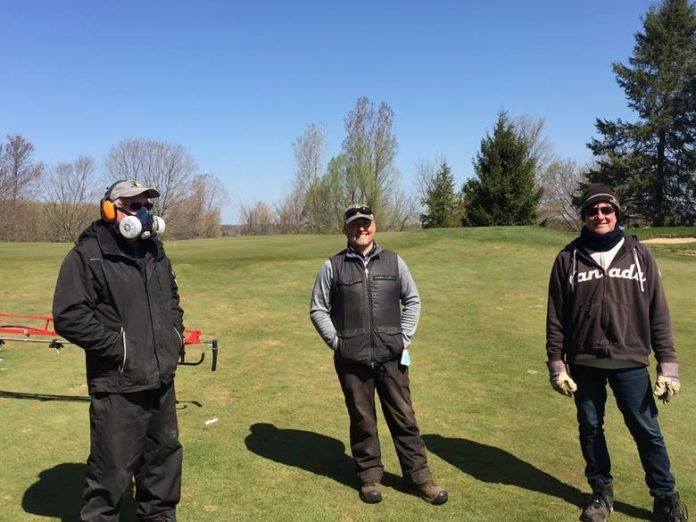
Regardless of whether you are in the inner city or cottage country, the people that are drawn to working “turf” are an incredibly diverse and often very colourful group.
Some of it comes from the fact that most greens crews are made up of a group of high school or university kids getting their first job; a bunch of old guys in what will likely be their last job; a small number of in-betweeners trying to feed a family on not a whole lot more than a minimum wage paycheque; and, if you are really lucky, one or two individuals looking to one day become a golf course superintendent.
Luke Paddle (centre) and staff at Dragon’s Fire Golf Club
With such a broad range of life experience, social skills, and differing levels of personal responsibility, it is often quite entertaining to watch how these characters come together and function as a team as the season plays out.
Going back a few years when I was an assistant superintendent at Oakdale Golf and Country Club, we were putting together our staff during the latter portion of the winter and we received a call from an individual who had worked for us a few years prior.
“Hey, it’s Mathew Blank. I worked for you a couple of years ago and I was hoping to come back,” he stated.
Amongst all of us in the office at the time (three assistants and two second assistants), not one of us remembered much of anything about this young man, either good or bad. In our defence, the greens crew at Oakdale tops out at about 50 staff members most years, and about 20 or so tend to be new faces each season (seemingly more than one of them named Mathew).
So, with little more to go on than a largely empty employee file from a couple of years ago, we settled on the fact that he couldn’t have been that bad if none of us remembered him, and we hired him back on for the season.
Now, out of this struggle to put a name to a face, I was reminded of one of the many hilarious ideas that one of the true characters and all-time best guys to have worked in the industry, Keith Walton, came up with many years ago: greens crew trading cards. Much like the hockey cards many of us collected as kids, the idea was to create a card for every member of the greens crew.
Not only would you be able to more easily put a name to a face, but you could also keep a record of some simple stats (like number of times getting stuck or running out of gas), well-earned nicknames, and some of the incredible stories that go hand in hand with working with such a diverse cast of characters.
Just think how cool it would be to have the card of one of your students raking bunkers or walk-mowing greens who goes on a few years later to win Olympic and world championship medals.
Or the card of a scrawny high school kid watering sod who goes on to build a career as a successful superintendent and host of several PGA events years later.
Greens crew trading cards could be an awful lot of fun to collect as the years go by and could certainly serve a valuable purpose connecting names to faces and the role the person played in the team’s success.
As both a hiring manager and a job seeker over the last few years, I have spent a considerable amount of time monitoring the various job boards here in Canada and in the US. A recent trend that has been emerging is the dwindling supply of educated and experienced candidates to fill leadership positions on greens crew teams.
Gone, it seems, are the days of the turf schools turning out loads of eager and talented recruits like they did in the 1990s and early 2000s. Much like the housing market swings from a buyer’s market to a seller’s market over time, it seems that the skilled labour market in the turf industry has swung dramatically towards the seller as well.
For one reason or another, superintendents posting everything from intern to assistant superintendent positions are reporting few, if any, qualified applicants for jobs that were once highly sought after in some markets.
The industry chatter is that we are reaching a critical point in some regions where a number of key leadership positions are going to remain unfilled even as the season begins.
The pressure is increasing on superintendents to adapt and create new supervisory roles that do not require substantial agronomic knowledge to help fill the leadership gap right now. Superintendents are also under pressure to invest time in community outreach to create an awareness of becoming a golf course superintendent as a career, so that there will be a supply of career-minded characters to take up leadership roles in the future.











